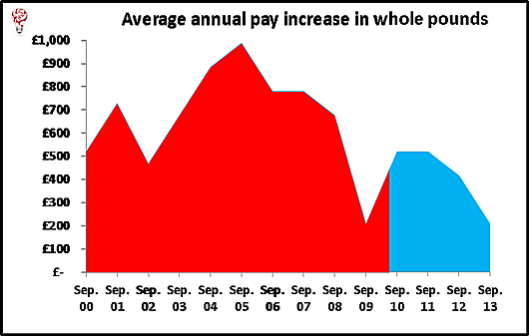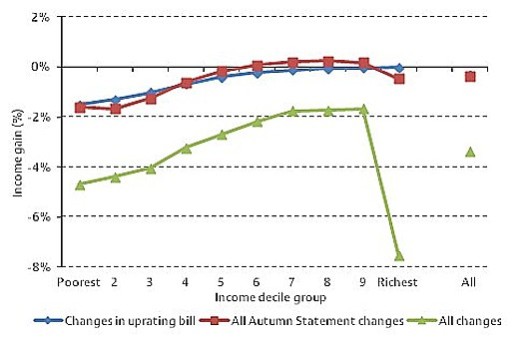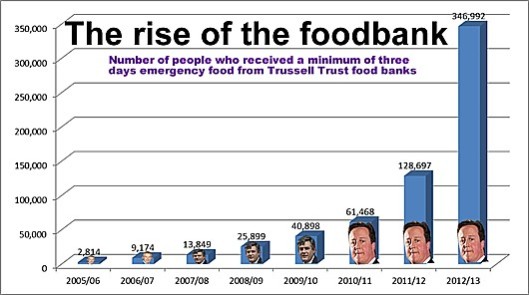
Iain Duncan Smith reckons there is no link between his
regressive changes to benefits and the rise of food banks. Let’s check that.
First, we’ll look at wages – because working people are going to food banks as
well as the unemployed. This graph clearly shows how wage increases have dropped
(while inflation has continued to boost prices).

As far as the effects of benefit up-rating measures are
concerned, reductions in entitlement are unsurprisingly concentrated in the
bottom half of the income distribution. The lowest-income decile group see the
largest fall in entitlements as a percentage of income (1.5%) as a result of
measures in the Bill, and the second decile see the largest decrease in cash
terms, losing about £150 per year on average.

What does this mean for foodbanks? This graph, showing
the exponential rise in their use, should be self-explanatory – to everyone not
at the DWP, at least.
He was in the headlines over the weekend after he accused food bank charity The Trussell Trust of “scaremongering” in order to get publicity for its work.
Refusing to meet representatives of the trust – thereby reneging (in advance!) on a promise we all heard during the food bank debate in Parliament last week – he stated in a letter written during November that the increased poverty forcing people to seek food bank aid was not linked to his regressive changes in the social security system, and that the charity was using this claim to get publicity for itself.
Quoted in The Observer, his letter began by criticising the “political messaging of your organisation”, which “despite claiming to be nonpartisan” had “repeatedly sought to link the growth in your network to welfare reform”.
He went on to reject suggestions that the government was to blame: “I strongly refute this claim and would politely ask you to stop scaremongering in this way. I understand that a feature of your business model must require you to continuously achieve publicity, but I’m concerned that you are now seeking to do this by making your political opposition to welfare reform overtly clear.”
Has nobody noticed that this attitude is clearly contradictory? If The Trussell Trust was a corporation that was seeking to increase its share of a market, then he might have a point, but the entire thrust of this charity’s argument is that everyone involved wishes they were not having to do this work. Any publicity it seeks is intended to reduce the need for food banks, rendering Mr Duncan Smith’s claims about publicity-seeking null and void.
One would have expected him to realise this when he found himself writing that the Trust had “repeatedly sought to link the growth in your network” – a growth that the Trust deplores – “to welfare reform”.
Also, if he wants to refute any claim he must provide evidence to the contrary – a feat that the Secretary of State for Work and Pensions has yet to manage regarding any of his policies.
But then, as Sir John Major has pointed out, he isn’t very bright.
A Department for Work and Pensions spokesperson, quoted in the same newspaper report, said, “There is no robust evidence that welfare reforms are linked to increased use of food banks.”
Oh no? Let’s resort to a little common sense then. What do you think happens when wages are pushed downwards for a period of more than three years, while benefits are slashed to the bone?
Exactly. Perhaps, if the DWP wants evidence, it should do some empirical research.
You can make a one-off donation to Vox Political here:
